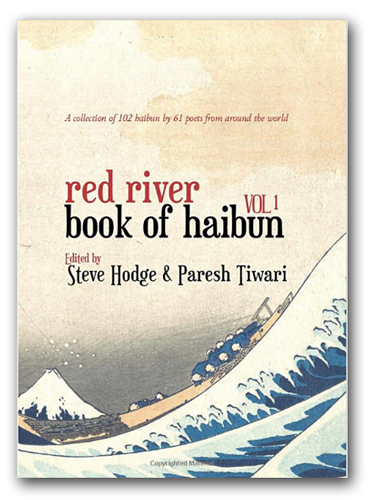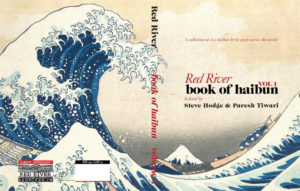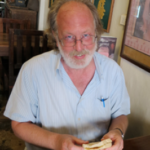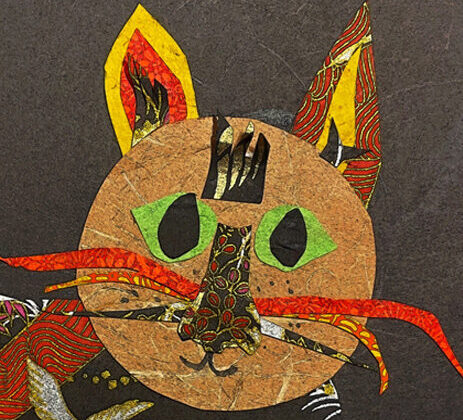
Book Review: Red River Book of Haibun, Vol. 1
Edited by Steve Hodge & Paresh Tiwari
Published by Red River
Patparganj, New Delhi, India
Nov. 2019, English Language
Paperback, 200 pages
ISBN: 978-81-942726-5-6
RRP: $14 U.S.
Ordering Information - Amazon U.S.
Ordering Information - Amazon India
Reviewed by Bob Lucky
Editors Steve Hodge and Paresh Tiwari timed this project well. It fills the void created by the end of Angelee Deodhar’s three volume Journeys: An Anthology of International Haibun and the closing of the online journal Haibun Today. And a volume 1 holds the promise of a volume 2.
The Red River anthology falls somewhere between the editorial focus of the other two projects. Deodhar’s Journeys was historically focused as it attempted to chronicle English-language haibun from its beginnings. Haibun Today championed the work of current writers of haibun and tanka prose.
Red River includes 102 haibun, 54 of which were previously published in 23 different journals, anthologies and collections, most within the past ten years. The list of contributors runs the gamut from those who’ve been writing haibun for decades to those newly smitten with haibun’s link and shift. In Tiwari’s introduction, he states, “With haibun’s relatively fluid nature in mind, this anthology seeks to present writers of every ‘persuasion’ and every ‘school.’”

I don’t know if every persuasion and school is represented in the collection, but the variety is immense and does highlight the fluid nature of haibun as it is currently being produced. Perhaps the only thing missing is a haiku-less haibun, which, to be fair, has always been more of a topic for discussion than a practiced form, much like Gerald Manley Hopkins’ curtal sonnet among the sonnet forms. I did spot one tanbun by Tia Haynes, and Harriot West’s “Ill-Fated” is an example of a haibun in which the lines in a haiku are separated by blocks of prose. There are a couple of haibun that are composed of free verse and haiku (Susan Beth Furst and Yesha Shah), a couple that are a mix of free verse, prose, haiku, and/or tanka (Johannes Manjrekar, Saima Afreen, Alan Summers). The remaining haibun are some variation on the conventional prose block(s) plus haiku.
The fluid nature of haibun to which Tiwari refers is most obvious in the innovations mentioned above, but it’s also in the nature of the prose and in the stretching of the definition of haiku. What holds a haibun together, literally and figuratively, is the link and shift; it’s also what is at the core of the definition of haibun. Only once, and I’ve read this book several times now, did I scratch my head and ask, “Does that link-shift work?”
The poets included are artisans aware of the essence of the form. With the link and shift between the prose (or free verse, etc.) and poem (haiku or tanka) successfully anchoring them, they exercise considerable freedom with respect to content, voice, prose genre, and haiku. Again, acknowledging the variety in this collection, some of the poets are drawn to prose poems, narratives and flash fictions; others are writing miniature memoirs or specializing in travel accounts and nature writing.
I would love to ask the poets here what they read besides haiku and haibun. I definitely heard echoes of Charles Simic, Russell Edson, and P. G. Wodehouse. Innovation and experimentation in the prose is welcome as it saves us from becoming pale imitations of Basho. It’s trickier with the haiku.
It seems to me that if the link and shift between the prose and the poem is at the heart of haibun, then the poem has to be a haiku or tanka if the writer wishes to avoid a sort of aesthetic arrhythmia. Getting the link and shift right is difficult, and often it’s highly dependent on having a strong haiku or tanka in the right place. I can only think of one haiku in this collection that isn’t a haiku; it’s an interrogative statement broken into four lines that would have made a fine concluding block of prose in a prose poem. If there’s no haiku or tanka in the mix, can it be a haibun?
I once wrote that a book of poetry is like a cookbook. If there are a handful of poems or aesthetic taste treats that you go back to again and again, it’s a keeper. In collections such as this, not every poem is going to taste good. The Red River Book of Haibun, Vol. 1 is a keeper.
I’m familiar with the work of many of the poets in this collection, but I’ve discovered some unknown to me that I want to check out. Every reader and writer serious about haibun and tanka prose should read this book, and they should recommend it to others. Too many cooks may spoil the broth, but there’s no such thing as too many poets.
About the Reviewer

Bob Lucky was the editor of cho from 2015 to January 2020. His collections include Ethiopian Time, Conversation Starters in a Language No One Speaks, and My Thology. He currently splits his time between Saudi Arabia and Portugal.
